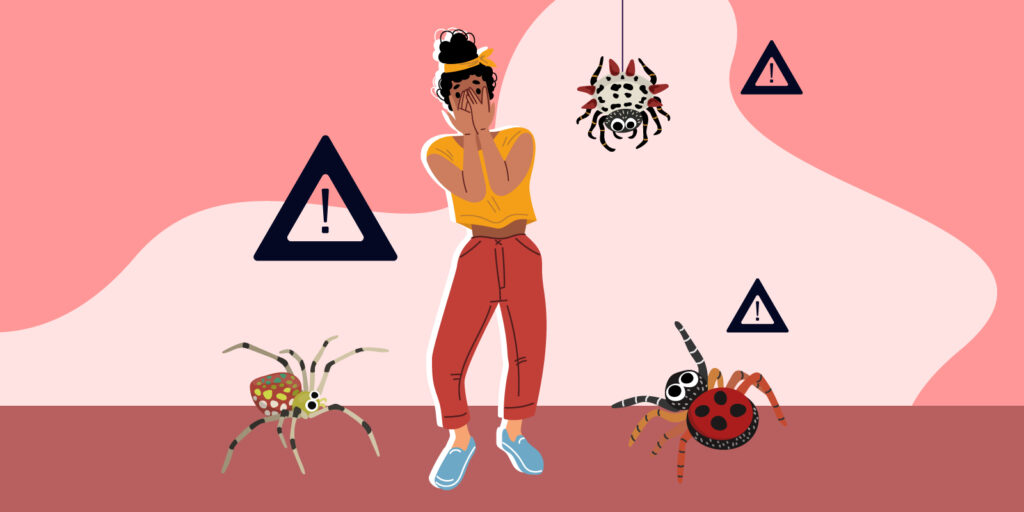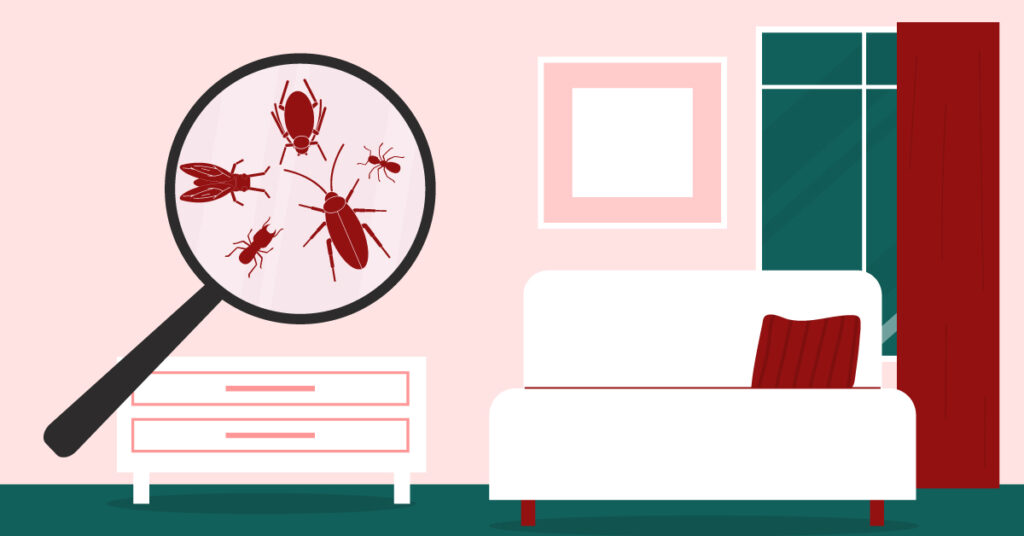Spring is a great time to start thinking about pest control in your home and garden. After the winter thaw, many pests that were dormant during the colder months will start to become active again. This can be a problem if these pests find their way into your home or garden, as they can damage plants and property and, in some cases, even transmit diseases to humans and pets. Continue reading on tips for spring pest control and the most common household pests to be aware of this year.
5 Tips For Keeping Pests At Bay After The Winter Thaw
- Seal Household Gaps: Use weatherstripping and caulking to seal gaps around windows and doors to help prevent drafts and prevent pests from entering. This includes gaps around windows, doors, and utility pipes.
- Clean Up Debris: Keep the exterior of your home clean and free of debris. Piles of leaves, branches, and other yard waste can provide harborage for pests.
- Repair Windows & Screens: Repair any damaged screens on windows and doors. Screens can help keep insects and other pests out of your home.
- Secure Your Food: Keep food stored in airtight containers and promptly clean up spills and crumbs. This can help deter pests that are attracted to food, such as ants and rodents.
- Use Natural Pest Control Methods: Consider using natural pest control methods, such as planting herbs or flowers that deter pests or using essential oils as a natural pest repellent.
Does the Cold Kill Pests?
Colder months can help reduce pest populations in some cases, as many pests are sensitive to cold temperatures and may die off or go into a state of dormancy when the weather gets colder. However, it’s important to note that not all pests are equally sensitive to cold temperatures, and some may be able to survive the winter in various ways.
For example, many insects and spiders can survive the winter by seeking shelter in warm, protected areas, such as inside homes, in leaf litter, or underground. Some insects, such as ladybugs and boxelder bugs, may even congregate on the sunny side of homes or other structures in the fall to take advantage of the warmth and wait out the winter.
In addition, some pests, such as mice and rats, may be able to survive the winter by seeking shelter in buildings and homes where they can find food and warmth. These pests can cause damage to structures and contaminate food and may require professional pest control to eliminate.
Common Household Pests

The most common pests found in homes can vary depending on the location and specific circumstances of the home. Here are some tips for treating specific pests.
Ants
Ants are attracted to sweet or greasy substances and may enter homes in search of food. They can be found in many different areas of the home, including the kitchen, bathroom, and basement. Ants can be annoying and may damage plants or structures, but they generally do not pose a serious health threat. They can, however, be very difficult to control if they form a colony.
How to Prevent Ants:
- Seal any cracks or crevices in the exterior of your home.
- Keep food stored in airtight containers and wipe up any spills or messes.
- Remove any sources of moisture, such as leaks or standing water.
- Use chemical pesticides to kill any remaining ants. Be sure to follow the instructions on the label carefully and use caution when handling the chemical.
Cockroaches
Cockroaches are scavengers that are attracted to sources of food, moisture, and shelter. They can enter homes through small cracks and crevices and are often found in kitchens and bathrooms. Cockroaches can spread diseases and contaminate food, and they can also trigger allergies and asthma.
How to Prevent Cockroaches:
- Seal any cracks or crevices in the exterior of your home to prevent cockroaches from entering.
- Keep food stored in airtight containers and dispose of garbage regularly.
- Remove any sources of moisture, such as leaks or standing water.
- Use chemical pesticides to kill any remaining cockroaches. Be sure to follow the instructions on the label carefully and use caution when handling the chemical.
Flies
Flies are attracted to sources of food and moisture and may enter homes through open windows or doors. They can be found in many different areas of the home, including the kitchen, bathroom, and basement. Flies can spread diseases and contaminate food, and they can also be annoying.
How to Prevent Flies:
- Keep windows and doors closed or screened to prevent flies from entering.
- Remove any sources of food or moisture, such as garbage or standing water.
- Use fly traps or fly paper to catch flies.
Mosquitoes
Mosquitoes are attracted to sources of moisture and may breed in standing water. They can enter homes through open windows or doors and can be found in many different areas of the home. They can breed in standing water and are attracted to the carbon dioxide and heat produced by humans and animals. Mosquitoes can transmit diseases, such as malaria and West Nile virus, and their bites can be itchy and annoying.
How to Prevent Mosquitoes:
- Keep windows and doors closed or screened to prevent mosquitoes from entering.
- Remove any sources of standing water, such as buckets, puddles, or clogged gutters.
- Use mosquito nets or mosquito repellents to protect yourself from mosquito bites.
Spiders
Spiders can enter homes through small cracks and crevices and may be attracted to sources of food, such as insects. They can be found in many different areas of the home, including the basement, attic, and crawl spaces. While most spiders are not dangerous, some species can bite and may cause allergic reactions.
How to Prevent Spiders:
- Seal any cracks or crevices in the exterior of your home to prevent spiders from entering.
- Remove any sources of food, such as insects or webs.
- Use chemical pesticides to kill any remaining spiders. Be sure to follow the instructions on the label carefully and use caution when handling the chemical.
Rodents
Rodents, such as rats and mice, can be a serious problem if they find their way into homes. They can cause damage to property, spread diseases, and contaminate food.
Rats and mice are attracted to sources of food and shelter and may enter homes through small gaps or holes in the exterior. They can be found in many different areas of the home, including the attic, basement, and crawl spaces.
How to Prevent Rodents:
- Seal any cracks or holes in the exterior of your home to prevent rats and mice from entering.
- Remove any sources of food, such as garbage or standing water.
- Keep food stored in airtight containers to prevent rats and mice from accessing it.
- Use traps or poison to kill any remaining rats and mice. Be sure to follow the instructions on the label carefully and use caution when handling the chemical.
Bats
Bats can sometimes become pests in houses if they find their way inside. This can happen if there are openings in the exterior of the house that allow them to enter, such as gaps around windows or doors, or if they become trapped in the attic or walls.
If you find a bat in your house, it is important to handle the situation carefully and safely. Bats are protected species in many areas, and it is illegal to harm or kill them. Additionally, bats can carry a variety of diseases (such as rabies, ebola and SARS coronavirus) which can be transmitted to humans through bites or scratches.
If you find a bat in your house, it is best to try to safely contain it and release it outside. You can do this by wearing gloves and using a box, container, or towel to gently capture the bat and release it outdoors. If you are unable to safely capture the bat, or if you are unsure how to do so, it is best to contact a professional wildlife control operator for assistance.
How to Prevent Bats:
- Seal any potential entry points and install screens or chimney caps.
- Make your home less attractive to bats by removing any sources of food or water, such as bird feeders or standing water.
Bed Bugs
Bed bugs are small, wingless insects that feed on the blood of humans and other warm-blooded animals. They are attracted to the warmth and carbon dioxide that humans and animals emit, and they can often be found in places where people sleep, such as beds, sofas, and chairs.
These bugs are most active at night, and they usually bite people while they are sleeping. They can bite any part of the body, but they are most likely to bite exposed skin, such as the face, neck, arms, and legs. Bed bug bites can be itchy and may cause red, swollen bumps on the skin.
If you think you have bed bugs in your home, it is important to take action to get rid of them as soon as possible. Bed bugs can be difficult to control and eliminate, and they can multiply quickly if left unchecked.
How to Get Rid of Bed Bugs:
- Wash and dry bedding, clothing, and other items on the highest heat setting possible to kill any bed bugs or eggs.
- Vacuum the entire house, including the furniture, to remove any bed bugs or eggs.
- Use a chemical insecticide to kill any remaining bed bugs. Be sure to follow the instructions on the label carefully and use caution when handling the chemical.
Moths
Moths can be attracted to homes if there are sources of food or moisture available, such as stored grains, flour, or pet food. They can also be attracted to light and may enter homes through open windows or doors. Once inside, moths can lay eggs and produce larvae (caterpillars) that can damage clothing, upholstery, and other household items.
How to Prevent Moths:
- Keep windows and doors closed or screened to prevent moths from entering.
- Use mothballs or moth traps to deter moths.
- Store food and grains in airtight containers to prevent moths from accessing them.
- Regularly vacuum and dust to remove any moth eggs or larvae.
Squirrels
Squirrels can also become pests if they enter homes or cause damage to property. They can chew on wood, siding, and wiring, and they may damage gardens or plants.
How to Get Rid of Squirrels:
- Seal any openings or gaps in the exterior of your home.
- Install wire mesh or other physical barriers to prevent squirrels from accessing your yard or garden.
- Remove any sources of food or water that may attract squirrels, such as bird feeders or standing water.
- Use chemical repellents or other deterrents to discourage squirrels from entering your property.
Year Round Pest Mitigation
There are several steps you can take year-round to help prevent household pests from becoming a problem in your home:
- Keep your home clean and clutter-free: Pests are often attracted to dirty, cluttered environments, so regular cleaning and organization can help deter them.
- Store food properly: Keep food in airtight containers and promptly clean up spills and crumbs. This can help deter pests that are attracted to food, such as ants and rodents.
- Repair any damage to your home: Pests can enter your home through small cracks and openings, so it’s important to repair any damage to the exterior of your home, such as holes in screens or broken window seals.
- Keep the exterior of your home clean and well-maintained: Piles of leaves, branches, and other yard waste can provide harborage for pests. Regularly cleaning up the exterior of your home can help deter pests.
- Use weatherstripping and caulking to seal gaps around windows and doors: This can help prevent drafts and prevent pests from entering your home.
- Consider using natural pest control methods: Planting herbs or flowers that deter pests, or using essential oils as a natural pest repellent, can help keep pests at bay.
While colder months may help reduce pest populations in some cases, it’s important to take preventative measures year-round to help keep pests away from your home. This can include sealing up cracks and openings, keeping your home clean and clutter-free, and using natural pest control methods.
If you do find pests in your home, it may be necessary to call a professional pest control company to safely and effectively eliminate the infestation. Remember that pest control chemicals can be toxic, so it is important to use caution when handling them and to follow the instructions on the label carefully.
You might also be interested in: The 7 Most Effective Pest Repellents To Keep Rodents And Insects Out Of Your Home




